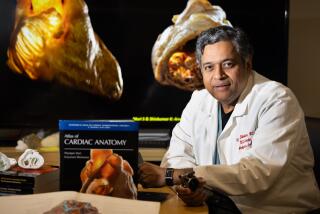Medical Iconoclast Attacks the ‘Holistic’ Path
- Share via
It was 10 years ago that philosopher-social scientist-historian Ivan Illich trained his sights on medicine in a book called “Medical Nemesis.”
A decade later, Illich has returned to the subject, convinced that, in some ways, the cure for what ailed medicine has turned out to be worse than the disease. This time, he is pursuing the new American obsession with health , a development he says is worse than “national hypochondria.”
Central to the problem he identified in 1976, contended Illich--borrowing a Greek-origin term from the medical lexicon and then radicalizing it--had become a phenomenon called iatrogenesis , or the problem of illness and injury caused by doctors, not cured by them.
Doctors and the technological system of hospitals and science they had created, Illich charged a decade ago, were running amok--perhaps bearing responsibility for as much suffering and disease as they cured.
A Radical Idea in the Mid ‘70s
Radical though it was in its time, it was an allegation that grew to attain great currency in an era only beginning to question the role of medicine in society and conclude that physicians were something less than god-like. And in the decade since “Medical Nemesis” was first published in its American form (an earlier version appeared in England in 1974), Illich’s philosophy became perhaps the seminal work in the movement challenging both medicine and doctors.
Now, Illich has returned to the scene, leveling new charges not against medicine, but against the American system of “health” consciousness that has sprung up at the behest of a wide variety of professionals and paraprofessionals. One of the ironies is that many of these new players, knowingly or unknowingly, base their claims to legitimacy on the questions Illich himself first raised.
This new enterprise at large has often been called the holistic health movement, a term that was coined as a means of describing care intended to oversee the whole range of health challenges but which has, in Illich’s view, turned too frequently into nothing more than a marketing ploy.
In the new perception of health, it is fashionable for the consumer to refer to “my body” as if it is a device like a car or a microwave oven that exists somehow apart from the intelligence of the individual, Illich contends. As simply another of life’s hard goods, then, it can be repaired, modified and subjected to all manner of performance enhancement techniques, with the degree to which health is achieved becoming a measure of one’s success as a human.
The spectacle of daily pilgrimages to aerobics classes and Nautilus fitness centers is a part of this, to be sure, Illich argues. But what is happening also includes stress-relief clinics, nutrition-advice centers, consumer-health publications and medical services advertised as somehow capable of engendering “health”--as opposed to merely the absence of disease--in a body not currently blessed with it.
One of the problems, argues Illich, is that such aggressive promotion of the concept of health implies that whatever health is can be achieved by anyone if he or she will only go to the trouble of pursuing it. This sense of health leaves no room for unattractive bodies that are not capable of lifting enough, running or swimming fast enough or otherwise excelling. Nor does it permit behavior that does not conform to an acceptable form of health consciousness.
Massive Overresponse Seen
So great is the magnitude of what Illich thinks is this now massive overresponse to the questions he and others have raised about traditional medicine, that he now believes--based on a collaboration with a German feminist historian--that the American health craze has so distorted reality that it has established itself as “the major pathogen” (organism that can cause disease) in society today.
Not only is this preoccupation a societal pathogen, they argue, but it is also unprecedented in Western history. In fact, say Illich and historian Barbara Duden, currently on leave from the Technical University of Berlin to teach this year at Pitzer College in Claremont, both the establishment of medicine as a strictly technical endeavor and its successor--the headlong pursuit of health --are concepts that existed nowhere prior to the last 30 years.
There is not yet a book in this from Illich and there may never be. He is concerned about the difficulties posed by reducing such a historical-philosophical complex into consumer form. “While ‘Medical Nemesis’ could be written as a popular rabble rouser,” Illich said in his pronounced Austrian accent, “this is very delicate, not (necessarily) for mass consumption.” (Illich also wrote “Deschooling Society,” a broadside against the American educational system in the 1960s.)
Over the weekend, Illich and Duden, with a handful of other historians and social scientists, gathered at Pitzer to explore the premise by Illich and Duden that what is appropriate today is a new academic discipline in “body history” that will try to frame a perspective for the ways in which the concepts of body and health have existed and evolved over the last few hundred years.
Illich and Duden discussed their work in an interview at the pleasant canyon home in the mountains outside of Claremont that Duden is renting this year from a Pitzer professor on sabbatical. (So far, the collaboration and the extended academic family that has grown up around it does not include physicians.)
For Duden, the reflection began, in many ways, with the discovery of the diaries of Dr. Johannes Storch, who practiced in Germany between 1720 and 1740 and left behind notes on conversations he had with more than 3,000 women patients. Storch reports in detail how they described their pains and ills and how they talked about themselves.
In the study of the history of medicine, Illich and Duden said, the Storch diaries are an invaluable resource because the physician’s notations are not confined to clinical observations. They are broader, taking into account not only how the patients felt but how they said they felt. Nowhere in the Storch diaries, said Duden, is there any implication that women of the 18th Century thought that their bodies were devices in their possession or that the disembodied body was even a concept that had occurred to them.
‘Nobody Was Concerned’
“In 1740, nobody said ‘my body.’ Nobody was concerned with the pursuit of health,” Illich said.
“They (German women of the era) were concerned with coping with pain, etc., but not with the concept of health where you think of a newly built machine and any malfunction is a kind of deficiency,” Duden said. “I think that kind of model is deeply inhuman.
“It is highly discriminatory to anyone who is not capable of functioning in this (‘healthful’) way. It includes those who are older, whose bodies are thicker and who are not so fast, whatever.
“What strikes me is that it really goes beyond the skin--creating this perception of the body where everyone could be concerned with (its) upkeep. (The) getting of this as part of the perception of wellbeing is like (George Orwell’s novel) ‘1984’ reembodied. I find it all very frightening.”
To Illich, the implications of what is happening are vast. Both he and Duden say it is a peculiarly American phenomenon. In fact, Illich calls the idea “post-Jeffersonian,” arguing that it is almost as if the Declaration of Independence has been rewritten to guarantee the right to life, liberty and the pursuit of happiness and health .
Nor is it strange to Illich that, in a commercial sense, the fall from godliness of the physician has been accompanied by ascendancy of an entire health-industrial complex whose business enterprises include everything from health food stores to sports medicine and chiropractic clinics.
“First of all, I consider the pursuit of health, which is becoming increasingly a professional pursuit in which every citizen has to participate as a paraprofessional, has become the major pathogen in society,” Illich said.
“It is a euphemism to call it a ‘national hypochondria;’ it’s much worse than that.
“It’s a very disagreeable development. It’s an aspect of something which I consider very frightening--the acceptance of the computer (as a device for the creation of) a model or a mirror in which people can better understand who and what they really are.”
Plentiful Lessons
John McKnight, director of the urban affairs program at Northwestern University in Illinois and a long-time friend and associate of Illich, has watched development of Illich’s new endeavor from a distance. In a telephone interview, McKnight contended that the history of what has occurred after both Illich’s broadsides at medicine and education contains plentiful lessons in how “things that once looked like alternatives have, as soon as identified, increasingly become co-opted, made into commodities and institutionalized.
“I think that what has changed (in Illich) is that he has seen how, particularly around issues of education and health, an ‘unprofessionalized’ space, once identified, can quickly become professionalized.
“The free school becomes a pilot for the ‘system.’ Nonmedical activity in the name of health becomes a market first and then secondly a market managed by a corps that now owns the facilities. Death is now the realm of the hospice. Grief and suffering are the domain of bereavement counselors and pain is in the realm of these new pain clinics.”






